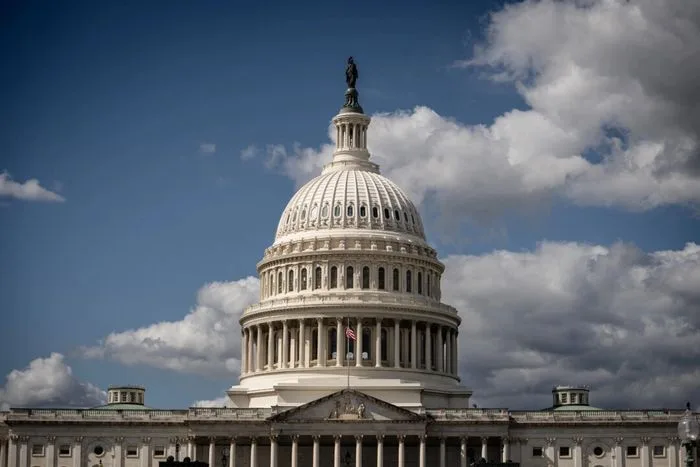By Jackson Richman
WASHINGTON—The federal shutdown will continue through the weekend as the Senate once again rejected rival funding bills to reopen the government on Oct. 3.
The federal government shut down at 12:01 a.m. on Oct. 1 after both parties failed to reach a deal to pass a short-term plan to fund the government through Nov. 21.
Days into the shutdown, Republicans and Democrats have continued to blame each other for the continuing deadlock that has shown little sign of easing.
House Speaker Mike Johnson’s (R-La.) announcement that the House will not meet next week was criticized by Senate Democrats, many of whom want a detail that would require the House to revisit the funding patch.
In a press conference with Democratic leadership after the Friday vote, Sen. Brian Schatz (D-Hawaii) said Johnson’s decision reflected a “lack of seriousness.”
The White House has signaled that mass layoffs are imminent and likely to number in the thousands.
Democrats have opposed the House-passed funding plan, demanding that the bill include a rollback of cuts to Medicaid enacted in the One Big Beautiful Bill Act over the summer.
They are also demanding an extension of enhanced subsidies under the Affordable Care Act, which were introduced during the COVID-19 pandemic and are due to expire at the end of the year.
Republicans have rejected these demands and said that while they were willing to negotiate on certain health care policies, they would not do so unless the government reopens.
The White House reiterated on Friday that it would not negotiate these health care demands with Democrats right now.
“Democrats must reopen the government if they want to have meaningful policy debate,” White House spokesperson Kush Desa told The Epoch Times in an emailed statement.
He told reporters that addressing ACA credits was “going to take time, because this is going to be a very complicated issue to address.”
On Friday, Republicans first rejected 46–52 a Democratic bill to include those provisions and fund the government through Oct. 31.
Democrats then blocked a 24-page Republican bill to fund the government through Nov. 21 that also includes security funding for the executive branch, Supreme Court justices, and members of Congress. The vote was 54–44.
In order for a bill to advance in the Senate, it must get 60 votes.
Sen. Rand Paul (R-Ky.) voted against both bills. While Sens. Catherine Cortez Masto (D-Nev.), John Fetterman (D-Pa.), and Angus King (I-Maine) joined Republicans in voting in favor of the GOP bill, they also voted for the Democratic bill.
This marks the fourth time the rival bills have failed to advance in the upper chamber.
Senate Majority Leader John Thune has said the chamber will return on Monday to consider these measures again.
While party leaders publicly dig in on their positions in the standoff, informal talks emerged among a group of moderate Senate Democrats and Republicans to find an off-ramp.
On Wednesday, several senators met on the Senate floor to discuss a one-year extension of the Affordable Care Act-enhanced premium tax credits.
“I’m glad we’re talking,” Sen. Raphael Warnock (D-Ga.) told reporters.
Sen. Mike Rounds (R-S.D.) told reporters that “a lot of people would really like to find a path forward.”
“But it requires, first of all, to get the government open again,” he said.
The proposal under discussion would extend funding for 45 days.
“And then we start working on the issues that divide us,” Rounds said.
Other lawmakers expressed pessimism about the scope and seriousness of ongoing conversations between the two sides.
“Are there even talks? There may be a couple of members talking to each other,” Sen. Ron Johnson (R-Wisc.) told The Epoch Times.
“You have to wait till they come around,” Sen. Rick Scott (R-Fla.) told reporters.
When it came to another issue dividing the camps—the White House’s ability to claw back appropriated spending through rescissions, a power it has exercised repeatedly—there was even more daylight.
“If Congress wants to change it, then we can pass a bill, we can get the votes for it, and then we can send it to the President’s desk and see if he’ll change it, right?” Sen. Markwayne Mullin (R-Okla.) told the Epoch Times. “But I’m not going to limit President Trump’s hands on things that are well within his authority.”
Sen. Tim Kaine (D-Va.) told reporters that any potential guarantee on rescissions “has to be ironclad, whether that’s in legislation or a real public agreement.”
Party leaders have continued to point fingers at each other for causing and prolonging the shutdown.
“Republicans have shut the government down because they don’t want to provide health care to working-class Americans,” House Minority Leader Hakeem Jeffries (D-N.Y.) told reporters on Oct. 2. “Republicans have shown zero interest in even having a conversation.”
Johnson told reporters on Friday that there’s nothing to negotiate on the Republican-backed funding bill because it simply extends current government funding levels.
In response to demands from Democratic Party lawmakers to extend expiring Obamacare subsidies, Johnson said it’s not an issue until the end of the year when the tax credits expire.
Republicans, he added, are currently working on reforms to fix Obamacare.
As to whether more Democrats will come on board and get the GOP bill across the finish line, Sen. Thom Tillis (R-N.C.) told reporters to stay tuned.
“Thune suggested next week there might be something happening,” he told The Epoch Times.
Nathan Worcester contributed to this report.





